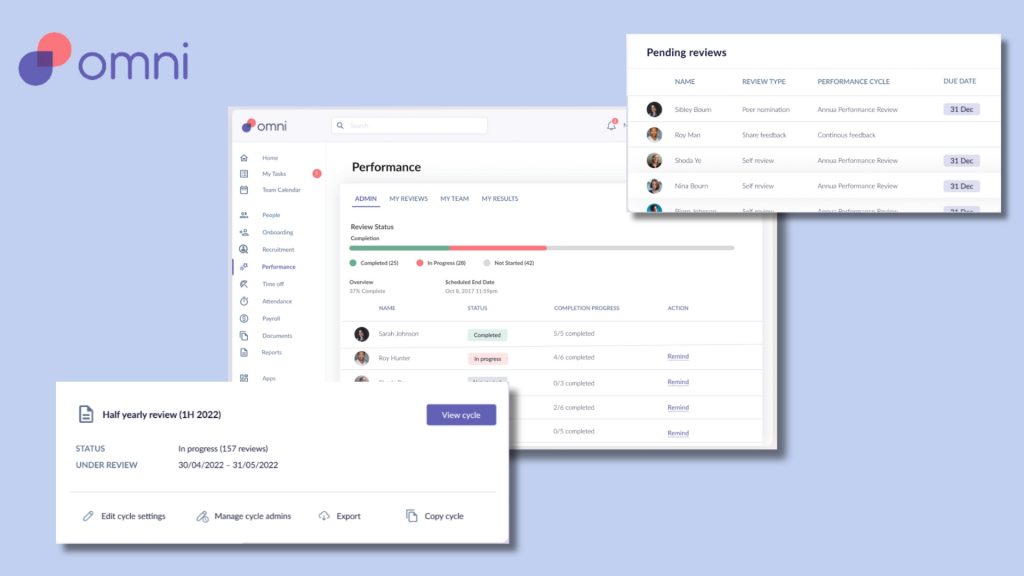Performance management is a critical practice to drive organizational success. By setting clear expectations and performance metrics, managers provide employees with a roadmap for success and a sense of direction that boosts company culture by creating a sense of belonging, increasing employee engagement.
Effective performance management fosters a culture of continuous learning and improvement, empowering employees to reach their full potential.
Ultimately, effective performance management creates a supportive and engaged work environment, unlocking the full potential of both individuals and your organization as a whole.
Understanding Performance Management
Performance management helps propel employees, and in turn your organization, towards their goals. It’s a continuous process that involves setting crystal-clear objectives, evaluating employee performance, providing meaningful feedback, and strategizing for improvement. By aligning your employee’s individual aspirations with your overall organizational objectives, goals, and values, performance management can become the driving force behind success.
Core Components of Performance Management

There are many facets and stages of performance management. These components make the building blocks for performance management. When these systems are enacted together, they help shape your employee’s experience and drive their performance.
Goal setting
Goals provide a sense of direction and motivation for employees. In setting goals, employees are able to see how their individual initiatives contribute to the overall success of your organization, and allow an opportunity to align personal objectives with that of the organization.
There are several ways to go about setting goals with your employees. Some of the most common are:
Performance review SMART goals
SMART goals, meaning specific, measurable, achievable, relevant, and time-bound, create a system to track and measure progress, which helps promote employee and organizational success. By implementing performance review SMART goals, managers are able to deliver actionable feedback to their direct reports and provide employees with a framework to understand how they contribute to the overall success of the business.
Objectives and Key Results (OKRs)
OKR goal setting encourages people to aim for the best possible outcome when setting team goals and objectives. The OKR goal setting framework creates a structure for goals to be identified, measured, and worked towards by both teams and individuals. Research has found teams that consistently use OKRs experience an increase in overall employee performance by 15.5%.
Key Performance Indicators (KPIs)
KPIs for employees, much like performance review SMART goals, help every area of your business move forward at the strategic level by providing goals and targets for your team to work towards. They are also milestones to measure progress, and insights that help employees across an organization to make smarter decisions. KPIs can help employees to stay focused, motivated, and engaged while providing clear direction for their professional growth and development.
Performance evaluation
Performance evaluations, unlike performance reviews, focus on an employee’s actual performance during the previous year. In other words, they measure the achievement of specific tasks within an employee’s job.
Assessing performance is like checking the pulse of your organization. Through various methods like employee self-evaluations, peer reviews, and manager assessments, you gain valuable insights into individual achievements, areas for growth, and the overall health of your team.
Continuous feedback
Feedback is the fuel that propels growth, it’s about providing constructive guidance, celebrating successes, and helping employees realize their full potential. Effective feedback should be continuous rather than intermittent, meaning feedback shouldn’t be reserved for quarterly or annual reviews but given on a regular basis in 1-on-1 one meetings, group settings, and informally. In fact, 43% of highly engaged employees receive feedback at least once a week.
Feedback cultivates learning, whether it’s positive or negative. Ongoing development and growth opportunities are one of the most important factors for job satisfaction, so having a manager who is also good at delivering negative feedback can make a big difference in the employee experience, not to mention their performance.
Performance reviews
Structured and precise performance reviews provide actionable feedback that motivates employees and helps set clear goals for the year ahead. When done well, performance reviews increase employee retention and improve productivity. Whether you conduct reviews on a quarterly, bi-annual, or annual basis, it’s important to have a consistent and clear structure in place to get the most out of the process.
Best Practices in Performance Management

Performance management is a multifaceted and continuous process, let’s review some of the best practices to help you set your employees up for success.
Continuous communication
Performance management thrives on open lines of communication. Regular check-ins and transparent dialogue between managers and employees create a supportive environment where feedback flows freely which helps gather insights and boosts employee engagement and company culture. Utilizing communication tools such as Slack are a great way to keep in touch for remote team communication, as well as quick and casual comments, where email and meetings are helpful for more formal conversations.
Employee involvement
Employees need to feel that their work and efforts are valued and make a meaningful contribution to the organization’s goals. When employees understand how their work aligns with the overall objectives and have a voice in setting their goals and monitoring progress, they are more likely to feel engaged. Empower your team by involving them in the goal setting process. It cultivates a sense of ownership and fuels intrinsic motivation.
Clear performance metrics
When it comes to measuring performance, clarity is paramount. Metrics act as guiding principles, providing a shared understanding of what success looks like within your organization. By defining specific, measurable, and relevant performance indicators, you can set clear expectations for employees, align individual goals with broader organizational objectives, and track progress accurately.
Clear performance metrics enable transparency, accountability, and objective evaluation, allowing for fair and consistent performance appraisals free of bias. Additionally, they empower employees by providing a clear roadmap for success and fostering a results-driven culture. Ultimately, clear performance metrics serve as the foundation for data-informed decision-making and continuous improvement, driving organizational success and employee development.
Recognition and rewards
Recognizing and celebrating employee accomplishments and contributions, whether significant milestones or small wins, shows employees that you value and appreciate the efforts they put into your organization’s success. A recent study found that when companies recognize their employee’s contributions, their employee’s are 73% less likely to “always” or “very often” feel burned out, and 5x as likely to see a path to grow in the organization.
Training and development
Invest in your greatest asset—your people! Provide them with opportunities to learn, grow, and develop new skills. Research shows 74% of surveyed employees feel they aren’t reaching their full potential at work due to lack of development opportunities. Helping your team feel they’re reaching their full potential not only enhances individual performance but also ensures your organization stays ahead of the curve.
By investing in your employees’ development, you are showing them that you value their growth and are committed to helping them succeed. This can help to increase employee motivation and engagement, as they’ll feel more invested in their role and the organization as a whole.
Tools for Performance Management
Performance management requires organization, diligence, and a clear strategy to achieve optimal results. But you don’t have to do it alone! There are many useful tools you can leverage to help you better manage your employees. Let’s take a look at some tools to aid in your performance management efforts.
Performance management software
Performance management software is a game-changer for managers, streamlining the entire process from goal setting to performance evaluations. It eliminates the hassle of manual tracking, providing a centralized platform to set, monitor, and update goals. With automated reminders and progress tracking, managers can stay on top of their team’s performance effortlessly.
360-Degree feedback tools
Tools that help gather 360 degree feedback — the comprehensive evaluation process that involves gathering feedback from multiple sources, including an employee’s supervisor, peers, direct reports, and sometimes even external stakeholders such as clients or customers — allows managers to gain a holistic understanding of an individual’s strengths, areas for improvement, and their impact on others. This well-rounded perspective enables managers to provide more accurate and balanced feedback, fostering growth and development.
OKR (Objectives and Key Results) platforms
Aligning individual and team goals with your organization’s objectives has never been easier. OKR platforms enable transparent tracking of progress and foster collaboration across departments by breaking down objectives into measurable key results. OKR platforms help managers create clarity and focus for their teams while facilitating clear paths of progress, enabling managers to assess performance against desired outcomes and make data-driven decisions.
Learning Management Systems (LMS)
Fuel continuous learning with LMS to foster employee development and growth. LMS provide a centralized hub for delivering training programs, courses, and resources. Managers can easily assign and track employee progress, ensuring that individuals have the necessary tools and knowledge to excel in their roles. LMS platforms empower managers to create a culture of continuous learning and upskilling within their teams.
Human Resource Information Systems (HRIS)
HRIS systems like Omni consolidate and automate HR processes, including performance management, into a single, user-friendly interface. Managers can easily access performance data, track goals, and review performance evaluations all in one place. HRIS platforms streamline administrative tasks, allowing managers to spend more time on coaching and providing meaningful feedback to their team members. With comprehensive performance data at your fingertips, your can make informed decisions, identify trends, and proactively address performance issues to drive continuous improvement for your teams.
Build Better Performance Management with Omni

Impactful leadership and performance management requires thoughtful and strategic actions to garner employee engagement and buy-in. Whether that’s through regular performance reviews, consistent and timely communication, or a strong understanding of employee engagement rates and performance through actionable data. Leaders that aim to deepen their impact can benefit from an HRIS system to help them automate and streamline their efforts, helping them free up valuable time to focus on the more strategic components of their role.
Omni offers a comprehensive set of tools to streamline and help you carry out the essential tasks of performance management. By automating the entire end-to-end employee lifecycle, Omni unlocks the ability for managers and leaders to support their employees without sacrificing their limited, valuable time on manual or repetitive tasks.
To learn more about how Omni can streamline and strengthen your performance management efforts, book a demo with our team.

Not ready to leverage automation but still want to boost your performance management processes? Download our free comprehensive Performance Review Kit complete with a variety of templates, guides, and best practices to get the most out of your next performance review cycle.


